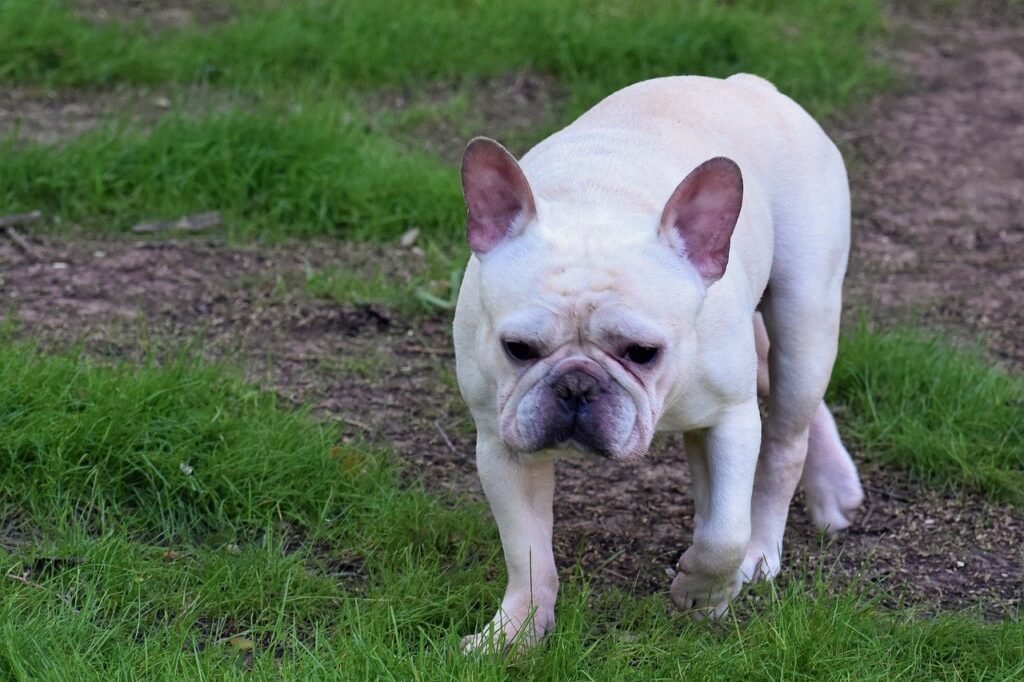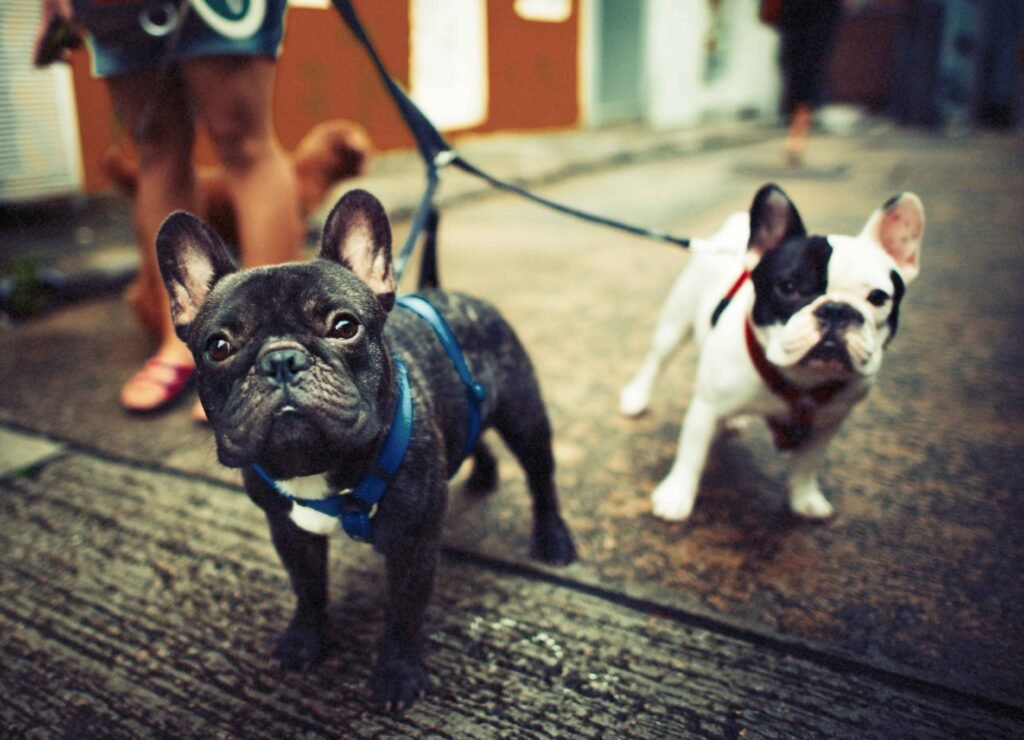Are French Bulldogs Aggressive? Understanding the Temperament and Behavior of French Bulldogs
French Bulldogs are beloved for their charming personalities, affectionate nature, and adorable appearance.
However, like all dog breeds, they have their own set of temperament traits that can vary from one individual to another.
In this article, we’ll explore the question: Are French Bulldogs aggressive? We’ll delve into various aspects of their temperament, upbringing, and environmental factors to provide a well-rounded understanding of their behavior.
Understanding French Bulldog Temperament
French Bulldogs are renowned for their friendly and sociable temperament. They thrive on human companionship and are affectionate, making them ideal family pets.
Their playful nature and gentle demeanor endear them to owners of all ages. French Bulldogs are known to be adaptable and enjoy being part of their family’s daily activities. While they may have a stubborn streak, they respond well to positive reinforcement training methods.
Early socialization plays a crucial role in shaping their temperament, helping them become confident and well-adjusted dogs. Overall, French Bulldogs are loyal, loving companions who bring joy and laughter to their households.

Are French Bulldogs Aggressive?
French Bulldogs are generally not aggressive by nature. They are known for their friendly and sociable temperament, making them suitable companions for families and individuals alike.
While individual temperament can vary, responsible breeding, proper socialization, and positive reinforcement training can help prevent aggression in French Bulldogs.
Owners need to provide a nurturing environment and address any behavioral concerns promptly through appropriate training and management techniques.
With proper care and attention, French Bulldogs typically exhibit affectionate and well-mannered behavior toward people and other animals.
Factors Influencing Aggression in French Bulldogs
Genetics
Genetics play a significant role in determining various traits, including temperament, appearance, and health, in French Bulldogs. Responsible breeding practices aim to produce puppies with desirable characteristics by selecting for specific genes while minimizing the risk of hereditary diseases or behavioral issues.
Breeders consider factors such as coat color, structure, and overall health when planning matings to ensure the continuation of desirable traits in future generations.
Understanding the genetic makeup of French Bulldogs is crucial for maintaining breed standards and promoting the well-being of the breed as a whole. Additionally, genetic testing can help identify potential health concerns and inform breeding decisions to improve the overall genetic diversity and health of French Bulldogs.
Socialization
Socialization is a critical aspect of raising a well-adjusted and confident French Bulldog.
It involves exposing the puppy to various people, animals, environments, and experiences during their formative weeks and months. Early socialization helps puppies develop positive associations with new stimuli, reducing the likelihood of fear-based behaviors or aggression later in life.
Positive interactions during socialization teach French Bulldogs how to communicate and interact appropriately with others, promoting good manners and preventing behavioral problems.
Consistent and gentle exposure to different stimuli builds their confidence and adaptability, making them more resilient in unfamiliar situations. Proper socialization is essential for fostering a friendly, outgoing, and well-balanced temperament in French Bulldogs, contributing to their overall happiness and well-being throughout their lives.

Training
Training is crucial for shaping the behavior and manners of French Bulldogs. Positive reinforcement training methods, which involve rewarding desired behaviors with treats, praise, or toys, are highly effective for teaching commands and instilling good habits in French Bulldogs.
Consistency, patience, and repetition are key components of successful training, as French Bulldogs respond best to clear expectations and positive reinforcement.Basic obedience commands such as sit, stay, and come are important for safety and communication, while crate training and housebreaking help establish routines and boundaries.
Additionally, socialization should be incorporated into training to expose French Bulldogs to different people, animals, and environments, helping them become well-rounded and adaptable companions.
Training sessions should be kept short and fun to maintain the dog’s interest and motivation. With proper training, French Bulldogs can thrive and develop into well-behaved and obedient pets.
Environment
The environment in which a French Bulldog is raised plays a significant role in shaping their behavior and well-being.
A stable and nurturing home environment with plenty of mental and physical stimulation is ideal for promoting the health and happiness of French Bulldogs. Adequate space for exercise and play is essential to prevent boredom and maintain physical fitness.
Additionally, a calm and predictable household atmosphere helps reduce stress and anxiety in French Bulldogs, contributing to their overall emotional well-being. Providing comfortable resting areas and access to fresh water and nutritious food ensures their basic needs are met.
Environmental enrichment, such as interactive toys, puzzles, and training activities, stimulates their minds and prevents behavioral issues.
Finally, a safe and secure outdoor space allows French Bulldogs to explore and interact with their surroundings under supervision. By creating a positive and supportive environment, owners can help French Bulldogs thrive and lead fulfilling lives as cherished companions.
Signs of Aggression in French Bulldogs
While French Bulldogs are generally not aggressive by nature, it’s essential for owners to be aware of potential warning signs. Signs of aggression may include:
- Growling or snarling
- Baring teeth
- Lunging or snapping
- Stiff body posture
- Prolonged staring
- Resource guarding
- Unwillingness to be touched or handled
Managing and Preventing Aggression
Preventing aggression in French Bulldogs starts with responsible breeding, early socialization, and positive reinforcement training. Additionally, owners can take the following steps to manage and prevent aggression:
Routine veterinary care
Routine veterinary care is essential for maintaining the health and well-being of French Bulldogs.
Regular check-ups with a veterinarian help ensure that any underlying medical issues are identified and addressed promptly.
During these visits, the veterinarian will perform a comprehensive physical examination, administer necessary vaccinations, and discuss preventive care measures tailored to the individual needs of the French Bulldog.
Additionally, routine veterinary care may include dental examinations and cleanings to prevent dental disease, as well as parasite prevention and control to safeguard against fleas, ticks, and intestinal parasites.
Proper Socialization
Proper socialization is vital for ensuring that French Bulldogs develop into well-adjusted and confident companions. It involves exposing them to a variety of people, animals, environments, and experiences from an early age.
This exposure helps them become comfortable and confident in various situations, reducing the likelihood of fear or anxiety-related behaviors later in life. Properly socialized French Bulldogs are more likely to interact positively with strangers, children, and other pets, making them more enjoyable and reliable companions.
Positive Reinforcement Training
Positive reinforcement training is a highly effective method for teaching and shaping behavior in French Bulldogs.
This approach focuses on rewarding desired behaviors with treats, praise, or other rewards, encouraging the dog to repeat those behaviors in the future. By using positive reinforcement, French Bulldogs learn to associate good behavior with pleasant consequences, making them more likely to exhibit desirable behaviors consistently.
Positive reinforcement training helps build a strong bond between the owner and the dog, as it fosters trust, confidence, and mutual respect. It also allows for a more enjoyable and engaging training experience, as French Bulldogs respond positively to rewards and praise.

Environmental Enrichment
Environmental enrichment plays a crucial role in promoting the physical and mental well-being of French Bulldogs. It involves providing stimulating activities, toys, and experiences that engage their senses and encourage natural behaviors.
Environmental enrichment helps prevent boredom, reduce stress, and alleviate behavioral problems in French Bulldogs by providing them with opportunities for mental and physical stimulation.
Examples of environmental enrichment for French Bulldogs include puzzle toys, interactive games, scent work, and obedience training.
Seek Professional Help
Seeking professional help is essential for addressing behavioral issues or concerns in French Bulldogs. Certified dog trainers, behaviorists, or veterinarians with expertise in canine behavior can provide personalized guidance and support to address specific problems effectively.
When seeking professional help, it’s important to choose a qualified and experienced professional who uses science-based, positive reinforcement methods. During consultations, professionals will conduct a thorough assessment of the French Bulldog’s behavior, environment, and history to identify underlying factors contributing to the issue.
FAQs: French Bulldogs
Are French Bulldogs prone to aggression?
French Bulldogs are generally not known for aggression, but individual temperament can vary.
Can aggression in French Bulldogs be trained out?
With proper training and management, many cases of aggression in French Bulldogs can be addressed effectively.
What should I do if my French Bulldog displays aggressive behavior?
Consult with a qualified professional, such as a certified dog trainer or behaviorist, for personalized guidance and support.
Are male or female French Bulldogs more prone to aggression?
Aggression can occur in both male and female French Bulldogs, but individual temperament is more important than gender.
Can health issues contribute to aggression in French Bulldogs?
Underlying medical conditions or pain can sometimes manifest as aggression in dogs, so it’s essential to rule out any health concerns with a veterinarian.
Conclusion
In conclusion, while French Bulldogs are not typically aggressive by nature, individual temperament can vary based on genetics, socialization, training, and environmental factors.
Responsible ownership, including proper breeding practices, early socialization, positive reinforcement training, and a nurturing environment, plays a crucial role in shaping a French Bulldog’s behavior.
By understanding the factors influencing aggression and taking proactive steps to prevent and manage it, owners can enjoy a harmonious relationship with their beloved French Bulldogs.





